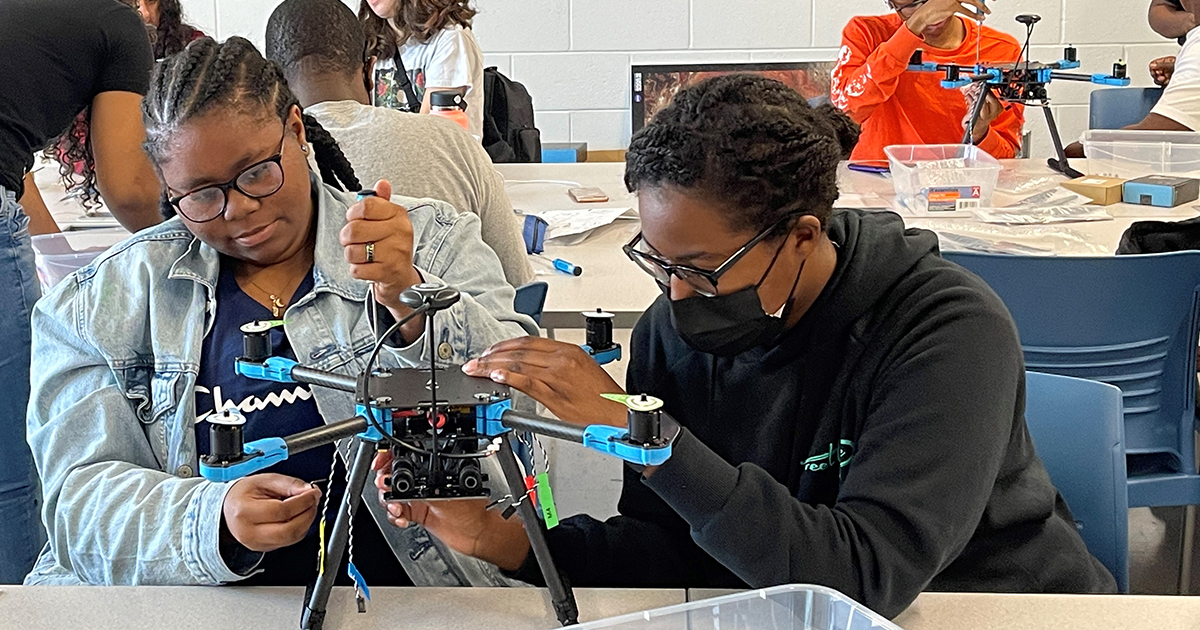Fayetteville State University Awarded NASA Grant to Support Geospatial STEM Summer Camps

Fayetteville, N.C. (May 19, 2023) — Fayetteville State University recently received a five-year grant totaling $423,487 from NASA's Office of Science, Technology, Engineering, and Mathematics Engagement’s (OSTEM) Minority University Research and Education Project (MUREP) to conduct free, two-week, residential summer camps aimed at preparing high school students — especially under-represented/underserved students — for success in college STEM degree programs and encourage STEM-related careers.
FSU was among seven Historically Black Colleges and Universities (HBCUs) and one Predominantly Black Institution (PBI) NASA selected to receive more than $3 million in total funding to strengthen their support for students in those communities in precollege summer programs around the nation.
The 2023 Precollege Summer Institute at FSU focusing on Earth Science and Geospatial Science and Technology: Cutting-edge Technologies for Examining Climate Change (CTECC) runs from June 5 to June 16. The camp is free (including room, board and field trips) and open to rising 10th - 12th graders in Cumberland and surrounding counties in North Carolina. Space is available for up to 20 participants. Students will learn about the connections between climate change, land cover/use change, and environmental health as well as practice multiple cutting-edge geospatial technologies that help mitigate the climate crisis.
The deadline to apply is Friday, May 26, 2023. Additional details and the online application can be found at: www.uncfsu.edu/geospatial/nasapsi.
The project is led by Trung V. Tran, Ph.D., GISP, who serves as principal investigator of the grant and assistant professor in geospatial science in FSU’s Department of Intelligence Studies, Geospatial Science, Political Science and History. During each of five summers over the grant’s five-year period, the institute will conduct annual two-week residential summer camps. The project is highly collaborative and includes more than 15 distinguished STEM partners such as NASA Goddard Space Flight Center, NASA Jet Propulsion Laboratory, NASA/North Carolina Space Grant, North Carolina State University, State Climate Office of North Carolina, NC State Center for Geospatial Analytics, Penn State University, Huck Institutes, Emerging Technology Institute (ETI), SpatialGIS, DowntownDC BID, and multiple schools and departments at FSU.
“We are thrilled to offer this unique, immersive experience to area high school students interested in STEM fields,” Tran said. “Having the opportunity to work on NASA-related research directly connected to its missions is truly transformative for our students. This program will open many doors and introduce students to possibilities they may never have considered. I am privileged to lead such an effort and look forward to working with incredible young scholars.”
“As we explore the cosmos for the benefit of all humanity, NASA remains steady in its effort to lift as we soar. NASA is not only committed to inspiring the Artemis Generation — we’re working to make sure they have the tools they need to succeed,” said NASA’s Senior Advisor for Engagement and Equity Shahra Lambert in announcing the awards. “This funding will help open doors of opportunity for high school students across the country to help prepare and empower them for the future.”
MUREP Precollege Summer Institute (PSI) uses evidence-based strategies to enhance high school students’ precollege performance, prepare them for college entrance, and ultimately help them achieve success in their higher education pursuits and in science, technology, engineering, and math careers.
“This project gives students an opportunity to experience what it’s like to live on a college campus, attend classes, and build relationships with professors and like-minded peers,” said Torry Johnson, MUREP project manager in the press release. “What makes this program special is that it’s tied to NASA research. Students will be participating in engineering design challenges and research related to NASA missions with support from NASA subject matter experts.”
